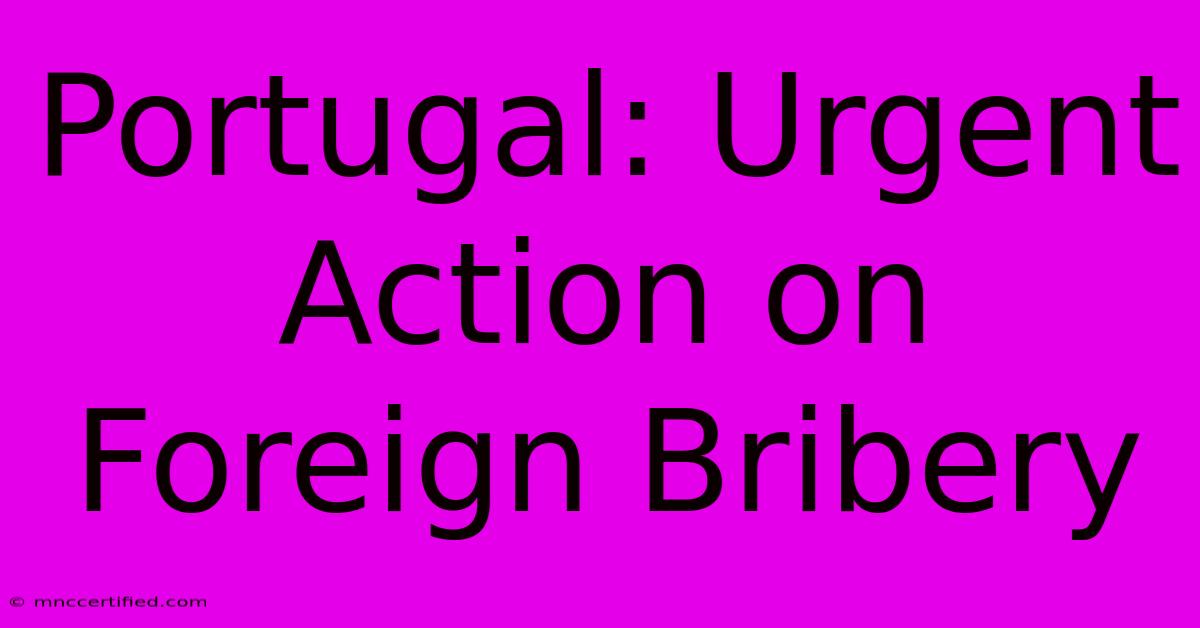Portugal: Urgent Action On Foreign Bribery

Table of Contents
Portugal: Urgent Action on Foreign Bribery
Portugal, a nation striving for global economic prominence, faces a critical challenge: tackling the pervasive issue of foreign bribery. While strides have been made in domestic anti-corruption efforts, significant gaps remain in addressing bribery committed by Portuguese companies and individuals operating abroad. This necessitates urgent and comprehensive action to bolster Portugal's international reputation, attract foreign investment, and ensure ethical conduct in its global business dealings.
The Severity of the Problem
Foreign bribery, the act of offering, promising, or giving something of value to a foreign public official to influence their decision-making, undermines fair competition, distorts markets, and fuels instability. For Portugal, its implications are far-reaching:
- Damaged International Reputation: Allegations of foreign bribery tarnish Portugal's image, deterring foreign investors who prioritize ethical business practices. This impacts economic growth and hinders Portugal's efforts to become a leading player in the global economy.
- Economic Losses: Bribery distorts market competition, giving unethical companies an unfair advantage and stifling innovation and legitimate business development. This ultimately leads to economic losses for Portugal.
- Weakened Governance: When bribery is prevalent, it erodes public trust in government institutions and undermines the rule of law. This instability creates an unfavorable environment for long-term investment and sustainable development.
- Legal and Diplomatic Consequences: International cooperation is crucial in combating foreign bribery. Failure to adequately address this issue can lead to strained diplomatic relations and legal repercussions for Portuguese companies and individuals operating abroad.
Strengthening Legal Frameworks
Portugal needs a robust and effectively enforced legal framework to combat foreign bribery. This involves:
- Strengthening the existing legal provisions: Ensuring that Portuguese laws align with international standards, such as the OECD Anti-Bribery Convention, and effectively criminalizing all forms of foreign bribery.
- Increasing investigative capacity: Investing in specialized units within law enforcement agencies to investigate and prosecute foreign bribery cases effectively. This requires adequate training, resources, and inter-agency cooperation.
- Improving corporate liability: Holding corporations accountable for the actions of their employees and agents, implementing robust internal compliance programs, and introducing significant penalties for corporate bribery.
- Protecting whistleblowers: Creating a safe and secure environment for individuals to report instances of foreign bribery without fear of retaliation. This crucial step encourages transparency and accountability.
Promoting Ethical Business Practices
Beyond strengthening legal frameworks, fostering a culture of ethical business conduct is paramount. This requires:
- Corporate Social Responsibility (CSR) initiatives: Encouraging companies to adopt and implement robust CSR policies that prioritize ethical behavior and transparency in their international operations.
- Education and Training: Implementing mandatory training programs for businesses operating abroad to raise awareness about anti-bribery laws and best practices.
- Public Awareness Campaigns: Educating the public about the consequences of foreign bribery and the importance of ethical business conduct.
International Collaboration
Effective enforcement necessitates strong international collaboration. Portugal should actively participate in:
- OECD Working Group on Bribery: Engaging actively in the OECD's efforts to combat foreign bribery, sharing best practices and collaborating on investigations.
- Bilateral agreements: Negotiating and strengthening bilateral agreements with other countries to facilitate information sharing and joint investigations.
Conclusion: A Call to Action
Addressing foreign bribery requires a multi-pronged approach. Portugal must act urgently to strengthen its legal framework, promote ethical business practices, and foster international cooperation. Failure to do so will have severe consequences for the country's economic development, international reputation, and its commitment to good governance. The time for decisive action is now. Only through comprehensive and sustained efforts can Portugal effectively combat foreign bribery and build a more transparent and prosperous future.

Thank you for visiting our website wich cover about Portugal: Urgent Action On Foreign Bribery. We hope the information provided has been useful to you. Feel free to contact us if you have any questions or need further assistance. See you next time and dont miss to bookmark.
Featured Posts
-
Life Insurance For Police Officers
Nov 16, 2024
-
Robert F Kennedy Jrs 5 Health Stances
Nov 16, 2024
-
Gaudette Insurance Whitinsville Ma
Nov 16, 2024
-
Long Term Care Insurance Wisconsin
Nov 16, 2024
-
Portugal 2 0 Poland Uefa Nations Live Score
Nov 16, 2024